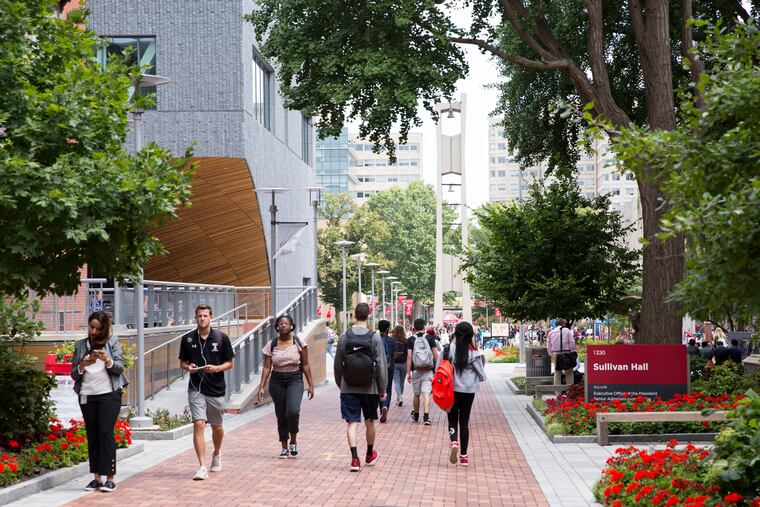HBCU-ish? Some say Temple T-shirts ignore the significance of actual historically black colleges.
The controversy surfaced long-held debates about the pros and cons of attending each kind of university and, some say, ignored how HBCUs came to be.

It was Sunday when someone sent a photograph to Ivan Bradley of a young woman wearing a red shirt with Temple University and HBCU-ish on the front.
Bradley, now 29, grew up in North Philadelphia, attended Germantown Academy, and chose to go to Hampton University, a historically black college or university, or HBCU, in Virginia.
To see someone from Temple — black population of less than 13 percent — claiming to attend an HBCU, or even just be “HBCU-ish” (a play on the ABC television show Black-ish), was a little off-putting.
“You’re either an HBCU," Bradley said, “or you’re not."
So, he shared his frustration online with the headline, “Excuse me?" and Twitter weighed in.
It’s appropriation. You’re disrespecting HBCUs. What’s the big deal?
Across Temple University’s campus Tuesday, not one of the T-shirts could be spotted. But the controversy over them surfaced long-held debates by black people about the pros and cons of attending each kind of university, and some say, ignored the significance of how HBCUs came to be.
“What is the -ish?” asked Karima Roepel, a graduate of HBCU Morgan State University in Baltimore who also has a degree from Temple. “Is it because it has a large black population? That’s not what makes a black school a black school. The parties don’t, either. It’s the shared experience. The shared experience of belonging. That’s what makes an HBCU an HBCU.”
A Temple spokesman said the shirts were neither produced nor sold by the university. But students interviewed on campus, none of whom had seen anyone actually wearing the HBCU-ish T-shirts, still said they understood the idea behind the message.
“There’s a tight-knit black community here and we come together on weekends to have parties and attend events at the [Black Student Union]," said Manny Nelson, an 18-year-old freshman from New York. “It can feel like an HBCU.”
In fact, in the same homecoming weekend where celebrities including Kanye West showed up at Howard University to perform — that was its own controversy after West’s statements about slavery being “a choice” — black students at Temple were joining with students from HBCU Cheyney and other colleges for a weekend called HBTU.
Lewis Baker, a Drexel University graduate who is getting a second bachelor’s degree with plans to attend medical school, said there is a unity among black students, especially those in the sciences. The 32-year-old neuroscience major said black students and faculty “go the extra mile to try to help each other."
And Nakima Parker, a sophomore studying psychology, said that she’s had the kind of bonding experience people talk about at HBCUs at Temple — with other students of color.
“I’ve found that many Asian American women students will approach me and say, ‘We’re the only women of color in this class, we have to stick together.' "
But HBCU graduates say wearing such a shirt in Pennsylvania — the home of the oldest historically black colleges in the country, Cheyney and Lincoln, both of which were founded in the 1800s — is proof the Temple students don’t know their black history.
HBCUs were formed in the years following emancipation for African Americans who were not being admitted to predominantly white universities. The mission of HBCUs was to educate black people.
“So when folks see that HBCU-ish T-shirt, at Temple, or for any other predominantly white institution, it screams cultural appropriation and extreme disrespect and disregard," said Will Mega, 47, who went to Temple undergraduate but earned his graduate degree at an HBCU. "It’s almost like educational black face.”
Bradley said he’s been in a room with black students from predominantly white institutions who “tried to discredit the education at HBCUs, but, when it comes to social life and all the cultural awareness, with all the celebrities going to HBCU homecomings, and Beyoncé making the Homecoming documentary, everyone wants to be part of the culture.”
In the end, Bradley said he doesn’t think people who wear HBCU-ish T-shirts intend any harm.
“It’s just that things are just so complicated at HBCUs with the underfunding and the stereotypes and then you take [a school] that’s not an HBCU and wasn’t founded to educate our people at a time when we couldn’t get educated...”
It’s just something not to take lightly, he said.